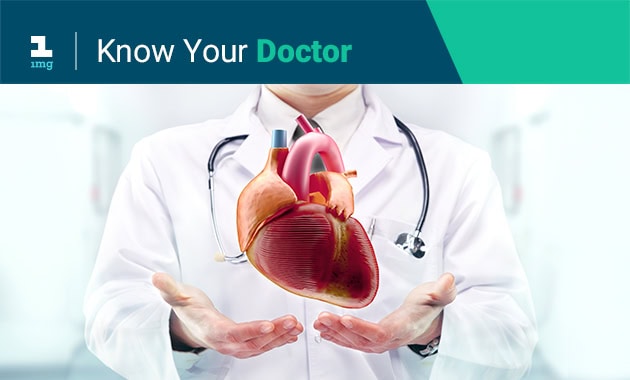
We all know that a heart specialist is an expert who specializes in diagnosing, treating and preventing heart-related illness and complications. However, not all cardiologists or heart specialists are the same. For example, if you have to undergo a stent placement surgery, then interventional cardiologist is the right expert to consult. If you are advised to undergo major surgery of the heart valves, then a cardiac surgeon is the expert to consult.
So in this series of Know Your Doctor, we are going to explain about the types of heart specialists and who should you consult for various heart problems.
General cardiologist: A general cardiologist is the expert to go to, if a person experiences any heart related symptoms such as pain in the chest, pain in the arm or difficulty in breathing. He is the one who will perform diagnostics tests to find the cause of the problem. Also known as non-invasive cardiologist, their main aim is to prevent and manage heart related problems. This includes prescribing medicines or recommending a dietary program. They may advice certain procedures for further investigations such as:
-Echo-cardiograms
-Electrocardiographs (EKG’s)
-Cardiac stress tests
-Nuclear tests
Interventional cardiologist: As the name suggests, interventional cardiologists are the ones who perform advanced treatments and procedures to improve heart health. They are trained in performing diagnostic procedures and treating cardiovascular problems. You can consult these experts for procedures such as:
-Cardiac catheterization (to detect heart blockages)
-Angioplasty (open blocked arteries)
-Balloon angioplasty
-Stent placements in closed or diseased arteries
-Plaque removal (atherectomy)
-Placement of mesh stents into narrowing arteries
-Valve repairs
Cardiac Electrophysiologist: These experts specialize in examining electrical impulses of the heart, which are responsible for the heartbeat. Cardiac electrophysiologist help in diagnosing and treating heart problems such as heart attack, cardiac arrhythmias (irregular heartbeat) and cardiac arrest. They are the ones who:
-Perform diagnostic tests such as echocardiogram and evaluate echocardiograms
-Perform surgeries to reduce the incidence of heart failure
-Install pacemakers and defibrillators
-Perform ablations to selectively destroy abnormal electrical pathways
-Prescribe medicines to manage irregularities in a patient’s heart rhythms
Cardiac Surgeon: Also known as cardiothoracic surgeon, a cardiac surgeon is the one who performs open heart surgery such as CABG (Coronary artery bypass grafting), valve replacement surgery, etc. They perform surgeries on the heart, blood vessels, veins and arteries. A cardiac or cardiovascular surgeon can treat:
-Coronary artery disease
-Heart blockages (valves and arteries)
-Atherosclerosis
-Aortic valve disease
-Mitral valve disease
-Abnormal enlargement of the heart
-Leaking of the heart valves
-Atrial or ventricular septal defects
(The article is reviewed by Dr. Lalit Kanodia, Consultant Pharmacologist)
Recommended Reads:
Check These Warning Signs Of Heart Attack In Women!!
7 Easy To Do Exercises For Healthy Heart